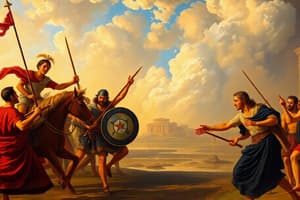Podcast
Questions and Answers
When was the Battle of Marathon?
When was the Battle of Marathon?
490 BC
Who was the Greek Leader during the Battle of Marathon?
Who was the Greek Leader during the Battle of Marathon?
- Pericles
- Themistocles
- Miltiades (correct)
- Callimachus (correct)
What were the tactics used by the Greeks?
What were the tactics used by the Greeks?
Positioned in the foothills, barred the way to Athens, defended by felled trees, employed strong tactics to envelope the Persians.
What happened at the Battle of Marathon?
What happened at the Battle of Marathon?
What was the Greeks' aim in the Battle of Marathon?
What was the Greeks' aim in the Battle of Marathon?
What advantage did the Greeks have?
What advantage did the Greeks have?
Who was the Persian Leader and what was his motivation?
Who was the Persian Leader and what was his motivation?
What were the tactics used by the Persians?
What were the tactics used by the Persians?
What equipment did the Persians use?
What equipment did the Persians use?
What equipment did the Greeks use?
What equipment did the Greeks use?
Why did the Greeks win?
Why did the Greeks win?
What were the consequences of Marathon for the Greeks?
What were the consequences of Marathon for the Greeks?
What were the consequences of Marathon for the Persians?
What were the consequences of Marathon for the Persians?
Flashcards are hidden until you start studying
Study Notes
Battle of Marathon Overview
- The Battle of Marathon occurred in 490 BC.
Greek Leadership
- Callimachus served as the primary commander of Athenian forces, with Miltiades as an advisor.
- Miltiades was instrumental in leading the Athenians against the Persians.
Greek Tactical Strategies
- Greeks positioned in foothills to defend against Persian advances toward Athens.
- Joined by 1,000 Plataean hoplites; terrain advantage utilized with felled trees to defend camp against cavalry.
- Persuaded by Miltiades, the Greeks launched a surprise attack at a run to evade Persian arrows.
Events of the Battle
- A stalemate initially prevailed until Miltiades convinced the polemarch to engage at Marathon.
- The Persian strategy was compromised as information from Ionian spies helped Miltiades.
- Miltiades employed a tactical formation with a weak center to envelop Persian forces.
- Victory news was relayed back to Athens via a runner, leading to two burial mounds for the fallen.
Greek Objectives
- The primary aim was to halt the Persian invasion of Greek lands.
Greek Advantages
- Greeks possessed superior knowledge of the local terrain, better preparation, and effective troop deployment.
Persian Leadership and Motivation
- Darius I led the Persians, motivated by a desire to punish Athens for its role in the Ionian Revolt.
Persian Tactical Strategies
- Persian tactics included utilizing a harbor and flat terrain for cavalry, aiming to outnumber the Greeks.
- Persians attempted to raid Athens before Spartan forces arrived but faced challenges without cavalry support.
Persian Equipment
- Persian soldiers relied on ranged combat using bows, wore minimal armor, and used wicker shields.
Greek Equipment
- Greek hoplites were equipped with greaves, cuirasses, metal helmets, and hand-held weapons like spears and swords.
Reasons for Greek Victory
- Familiarity with terrain, superior discipline, and tactical planning by Miltiades led to a decisive victory.
- Persian cavalry could not be effectively used due to an unexpected attack timing.
- Greek hoplites fought cohesively as an armored unit, while Persians lacked coordination.
Consequences for Greeks
- Boosted morale and self-confidence among Athenians; demonstrated that Persians could be defeated.
- Strengthened Athenian prestige and military reputation, contributing to the rise of democratic practices.
- Highlighted the superiority of the hoplite phalanx over Persian forces.
Consequences for Persians
- The loss diminished the Persian fleet and led to a reevaluation of their invasion strategies.
- Persian military failures instigated a return to conflict as they learned from their mistakes.
Studying That Suits You
Use AI to generate personalized quizzes and flashcards to suit your learning preferences.




